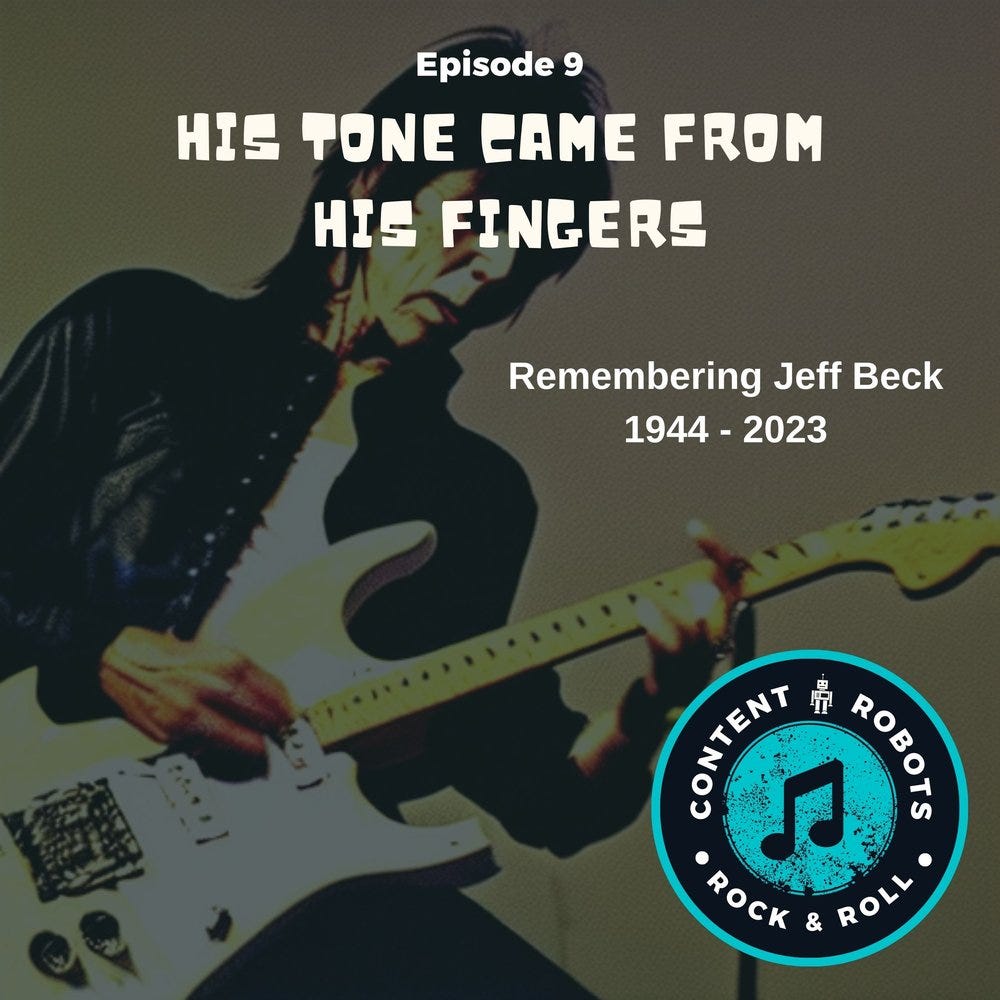Podcast Episode Details
Listen to the podcast to find out:
Why (and how) Jeff Beck could connect with audiences on such an emotional level.
How we can make our content creation inspirational, yet un-copyable.
Why it’s important to master the fundamentals of automation and content AI in order to make more creative and more unique content.
Remembering Jeff Beck
Last Wednesday, a few hours after the last episode of the "Content, Robots, and Rock and Roll" podcast came out, we got the news that legendary guitarist Jeff Beck had passed away.
I came to appreciate Jeff Beck a little later in my life. I think that was because he was a rather difficult artist to pin down music-wise. He didn't fit neatly into my teenage rock & roll brain. It took a while for me to truly appreciate his music. Once I did, I really did.
Jeff Beck was a prolific artist whose career spanned decades. He released dozens of albums in many different genres — rock and roll, blues, and jazz fusion being the most prominent. Beck had the unique ability to connect with audiences on an emotional level. I wish I'd been in one of his live audiences. I never got the chance to see him live. He truly pushed the boundaries of what was possible in the world of music — particularly on the guitar.
Let's take this occasion to remember Jeff Beck, and see what lessons and inspiration we can learn from him that we can apply to the content that we create.
Human Creativity and Invention
Here at Content, Robots, and Rock and Roll, we don't shy away from technology. We embrace it and look for ways to use it to make us better and more creative.
Beck shared that viewpoint on technology. He was a pioneer and an innovator. In the 1960s, during his work with the Yardbirds, Beck was among the first to incorporate guitar sounds like fuzz and distortion — something that quickly became the norm. In the 1970s he drifted into the world of jazz fusion and made some innovative music with synthesizer pioneer Jan Hammer, and many others.
If you play guitar or at least pay attention to a lot of guitarists, you may have heard the phrase that "their tone comes from their fingers". People often use this statement about a select group of elite guitarists who:
1. Can deliver a distinct and appealing tone regardless of what guitar they're using or what effects and amplifier they're playing through.
2. Have a sound so instantly recognizable that you know who it is when you hear it.
Eddie Van Halen comes to mind. Steve Vai. Brian May. Of course, Jeff Beck, sits atop the list. Beck's technique and style of playing were so unique that it's hard to think of another guitarist that sounds like him.
Inspirational, but Un-copyable
When I was working in the corporate world, we in the marketing department would often have discussions with our technology and product teams on how to promote our technology. "This product is really cool and innovative — a true differentiator," someone might say. When we tried to promote and tell stories about the technology, we'd hear, "I don't know if we want to talk about its features so openly. We don't want a competitor to copy it."
To that, I'd think to myself, or say out loud, depending on how bold I was feeling at the time — "Would it really be that easy to copy if it were truly that unique and differentiating?"
I think of Jeff Beck in that setting. He was truly innovative. You could see exactly what he was doing. It wasn't a secret — and yet nobody could really copy him. Of course, the legions of guitarists he influenced imitated what they could from him. Rightly so. Can you name a guitarist that people would call a "Jeff Beck clone"? I don't think so. Beck was — and still is — inspirational — but uncopyable.
Be a Master of the Fundamentals
How do you achieve inspirational, yet uncopyable? In my mind, you achieve it through an intense and rigorous commitment to getting better. Though unique and unconventional, Jeff Beck was a fundamentally sound guitarist. He worked at his craft.
Let's apply this in general to content creation. Anybody can throw a set of instructions into ChatGPT or Dall-E 2 and get something back that's reasonable. The AI tech has gotten good enough that anyone can operate it. So how do you become the Jeff Beck of AI content generation? You do it by knowing how to play it the right way. Instead of the guitar, I mean the robots — or the AI technology products that are on the market now.
We need to learn what cues to give these robots to get the best results. We must understand the fundamentals of this new technology to be able to play it in cool and innovative ways.
How do we do that? Well, it takes practice. It takes trial and error. It takes some work. It takes the knowledge and comfort that comes with knowing when to let the robots take the wheel, and when to drive yourself.
Right before the holidays I released an episode featuring Lionel Richie's Rock and Roll Hall of Fame speech. In Richie's words, "are you a created artist or a creative artist?"
Jeff Beck was a creative artist in all the best ways. For Beck, technology, guitars, pickups, guitar effects, amplifiers, synthesizers — they all complemented his unique style, and sound, but they didn't create it.
The musical creations made by Jeff Beck came from him. They came from his mind, his technique, his vision, and his talent. That's where we need to start when thinking about our content robots — meaning AI, machine learning, automation. Let's make them complements to what we can already do. Not the other way around.
Five Great Jeff Beck Albums (and one YouTube video)
Here are my recommendations if you're interested in seeing and hearing some of the brilliance of Jeff Beck:
The Yardbirds: Roger The Engineer (1966) - Beck replaced Eric Clapton in the Yardbirds in 1965. He played on a few songs of the previous album, For Your Love, but Roger The Engineer is the record that most prominently features Beck's work with the band. Apple Music | Spotify
Truth (1968) - Jeff Beck's first solo album, featuring Rod Stewart and Ronnie Wood on vocals and bass guitar, respectively. Apple Music | Spotify
Blow by Blow (1975) - Jeff Beck's entry into the world of jazz fusion. Famed Beatles producer, George Martin produced the album. Apple Music | Spotify
Wired (1976) - Beck moves further into the world of jazz fusion with this album, again produced by Martin and featuring keyboardist, synth-pioneer, and future Miami Vice theme composer, Jan Hammer Apple Music | Spotify
Jeff Beck's Guitar Shop (1989) - This was the first Beck album I was aware of as I was just starting to play guitar around this time. Ads for it were all over the guitar magazines. Guitar Shop is a return to more instrumental blues rock and features Tony Hymas on keyboards, and Terry Bozzio (of Frank Zappa fame) on drums and percussion. Apple Music | Spotify
The first thing I did when learning of Jeff Beck's passing last week was to go to YouTube to watch some life performances. My favorite has to be his performance from several years ago at Ronnie Scott's - a famous jazz club in London. It features Beck, along with legendary session drummer Vinnie Colaiuta and up-and-coming (at the time anyway. Now, she's here) bass guitar star, Tal Wilkenfeld.
Thanks, Jeff Beck, for all of the great music and inspiration. You're a legend, and you'll really be missed.







His Tone Came From His Fingers: Remembering Jeff Beck